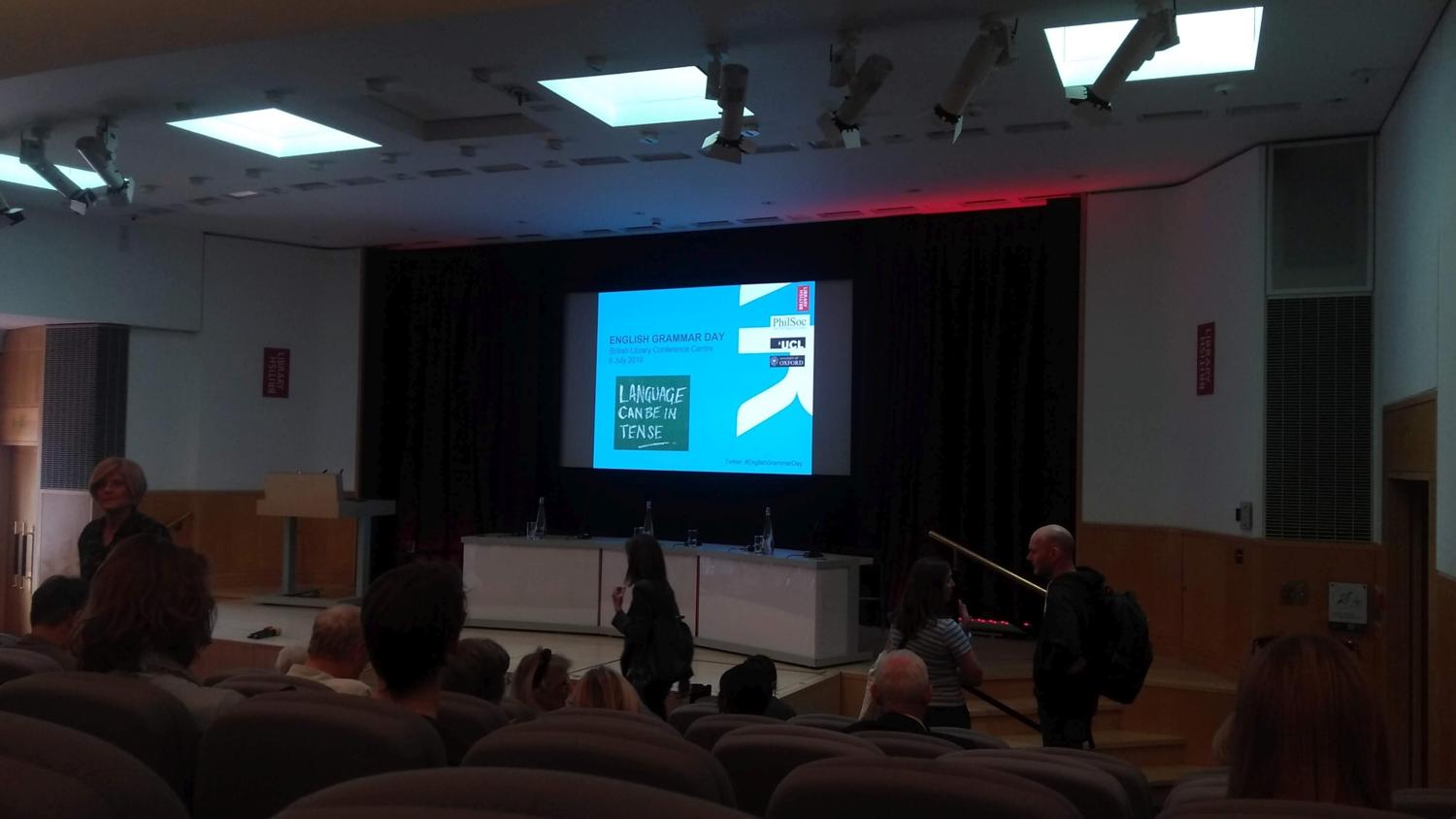So, when I told another SfEP member that I was going to English Grammar Day at the British Library, he was like, ‘I hope it doesn’t just involve complaining about Americanisms and overworked shop assistants writing “Out off order” signs’. Well, I was kind of expecting it would be just that – but, you know, it actually turned out to be kind of a subversive celebration of language change. And, yes, it also acknowledged the numerous linguistic tics I’ve already used in this opening paragraph. I suspect that prescriptively inclined delegates went home despairing of the deteriorating state of the English language. But, if they did, they weren’t paying attention.
 Editors tend to be descriptive, not prescriptive, in their approach
Editors tend to be descriptive, not prescriptive, in their approach
For me, the day raised the issue of how we, as editors, can balance the prescriptive and descriptive elements of language use. It’s all very well for academics to shrug their shoulders and agree that things change, but where do we stand when our job is to ensure that text in the public domain is correct?
Or is that our job? Perhaps we should regard our work more as facilitating communication. Most modern editors would probably agree that it is. SfEP members formed a good proportion of the audience and I didn’t hear any of them grinding their teeth (except when it was suggested that nobody would miss the possessive apostrophe). In fact, most of us nodded at Rob Drummond’s graph indicating that pedantry decreases as language knowledge increases.
I’ve put it on twitter several times before, but for those to whom this is new (check me, using ‘whom’😁), this is the full version of that pedantry graph… pic.twitter.com/R4rxeriOsn
— Rob Drummond (@RobDrummond) July 8, 2019
When people criticise the language of others, it’s almost always about more than language
Take Zwicky’s bias warnings, quoted by David Denison:
- The recency illusion – a belief that things you notice recently are recent.
- The frequency illusion – once you’ve noticed something, you see it everywhere but that doesn’t mean it happens all the time.
We all have our tics and bugbears. I hate constructions like ‘We were sat on the bench’ and ‘Come with’ (it’s ‘come with ME’, dammit!) and would correct these in written text without a second thought. On the other hand, I am aware that all my conversations are peppered with the oft-despised ‘like’. As Rob Drummond said in his talk, ‘standard’ English is an arbitrary accident of history, reflecting the balance of power and personal choices that may, or may not, have gained wider traction. The speech of those who decry ‘like’ or the exclamatory ‘so’ almost certainly features other discourse markers that nobody seems to mind – ‘kind of’, ‘well’, ‘you know’, ‘I mean’, ‘actually’. Your ‘overuse’ of linguistic tics may be someone else’s normal. They’re not necessarily devoid of meaning, either – it was pointed out that certain academics’ use of ‘as it were’ could imply that the speaker feels that ordinary words are not adequate to express the brilliance of their insight!
There is evidently a difference between what people say and what people think they said, and, frankly white, middle-aged, middle-class men – those with the power – receive less linguistic criticism than other groups in society. Everyone has preferences but when these become judgements and prejudices, these preferences are problematic. The use of ‘he’ as a singular generic pronoun has, thankfully, fallen out of favour but the lack of an alternative term raises new issues. Charlotte Brewer analysed actor James Woods’ recent tweet complaining about the singular ‘they’, taken by many to be transphobic. Dictionaries tend to avoid the matter, as well as failing to reflect new definitions of other gendered words – ‘husband’ and ‘wife’, for example. Do dictionaries record or sanction use – or neither? A woman may have a wife, whether or not the dictionary says it’s possible.
Non-standard may become standard but, even if it doesn’t, non-standard does not mean sub-standard. In fact, it often does a better job of communicating than standard forms. A good example is the sophistication and eloquence of much grime music and rap. Check out The Hip-hop Shakespeare Company for more evidence.
 To misquote Taylor Swift: ‘Hey, kids! Grammar is fun!’
To misquote Taylor Swift: ‘Hey, kids! Grammar is fun!’
Grammar is often taught in primary schools by those who are not confident in describing the technical details. To be honest, many editors make a good living without knowing what a modal verb is, or caring about the difference between ‘which is better?’ and ‘which is best?’. Does it matter? Probably not, if the aim is to pass Key Stage SATs or to make a passage of text easier to understand. But English Grammar Day showed that grammar is about much more than whether fronted adverbials improve a piece of prose.
Editors normally work with the written word. Most users of English differentiate between writing and speaking modes, but younger people often blend the two. Electronic forms of communication (texting, for example) may reflect spoken language written down, but we don’t yet have the terminology to grammatically assess it.
There is always an element of choice in how we use language. Non-standard grammar can both reflect, and play a role in, the performance and expression of our identities. Code-switching is not a problem for most speakers if they first recognise the need and then choose to do so. Contrary to rumour, there is apparently no evidence that GCSE and A-Level examiners have come across text-speak – clearly, young people know how to meet the standards appropriate to the situation. The theme of our 2017 SfEP conference was ‘context is key’ – nobody is saying that students shouldn’t use standard grammar in formal essays, but they don’t need to use it in everyday writing and speech, as long as their audience understands them.
Which brings us back to how editors could address these issues. There’s one short answer. Rob Drummond added a coda to his graph that, ‘You can become a pedantic anti-pedant and that’s unattractive as well.’ Our job, as those with the language knowledge, is to educate pedants. And, sometimes, our job is to recognise that we are those same pedants.
With thanks to the day’s speakers, who provided the springboard for my thoughts in this blog post and to whom I apologise for any inadvertent plagiarism: Charlotte Brewer, Jon Hutchinson, David Denison, Ingrid Tieken-Boon van Ostade, Barbara Bleiman, Rob Drummond and John Mullan.
And with apologies to my proofreader for the first few sentences.
 Julia Sandford-Cooke of WordFire Communications has 20 years’ experience of publishing and marketing. She has written and edited numerous textbooks, specialising in vocational education, media studies, construction, health and safety, and travel. Check out her micro book reviews on Ju’s Reviews. Don’t ask her to explain what a modal verb is.
Julia Sandford-Cooke of WordFire Communications has 20 years’ experience of publishing and marketing. She has written and edited numerous textbooks, specialising in vocational education, media studies, construction, health and safety, and travel. Check out her micro book reviews on Ju’s Reviews. Don’t ask her to explain what a modal verb is.
You can brush up your grammar with the SfEP’s online course.
Proofread by Joanne Heath, Entry-Level Member.
Posted by Abi Saffrey, SfEP blog coordinator.
The views expressed here do not necessarily reflect those of the SfEP.
